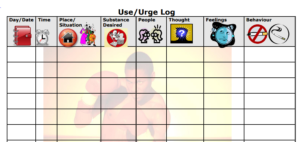
1. What was the trigger?
2. How were you feeling just before you felt like drinking or drugging?
3. What were you telling yourself just before you started to drink or drug? (Look for additional, hidden thoughts.)
4. What did you do?
5. Which thoughts led to which addictive feelings and behaviors?
6. What was the chain of thoughts, feelings, and actions?
7. What could you have told yourself?
8. What could you have done?
9. What emotions could you have pushed yourself to feel?
10. How do you feel now about what happened?
BACKWARD STEPS TO ADDICTIVE BEHAVIORS
TRIGGERS — External, interpersonal, and intrapersonal. Which areas are the riskiest for
you? Which do you have the most difficulty combating? Rate each category from 0-10
(where 10 is the riskiest or most difficult).
a.____ Conditioned responses in certain settings
b.____ Unpleasant emotions
c.____ Unpleasant physical sensations
d.____ Pleasant emotions
e.____ Pressure from others
f.____ Conflict with others
g.____ Socializing
h.____ Testing personal control
IMAGINING/FANTASIZING — Start to imagine what it would be like to… how you
would feel, how you would think and act … then…
“STINKING THINKING” — Irrational beliefs, cognitive distortions, and
rationalizations that you used to convince yourself to take the backward step.
a.____Negative exaggeration; awfulizing; catastrophizing.
b.____Self-downing / self denigration.
c.____ Rationalizations:
“It won’t really matter.”
“I deserve it.”
“I will only have one.”
“It’s been a long time.”
d.____Low frustration tolerance:
“7 can’t stand it.”
“It’s awful.”
e.____The tyranny of the should:
“It shouldn’t be so hard.”
“I shouldn’t have this problem.”
“S/he shouldn’t speak to me that way.”
“The world stinks, and it shouldn’t!”
PLANNING
—‘Tll just go down to the store and buy a bottle.”
—“I’ll finish this project and then go to the bar.”
—‘Tll take some money out of my other account.”
— Others:_____________________________________________________
ACTING — Behaviors that led to UNDESIRABLE OUTCOMES (list them)
Teach yourself how to respond at each step. Even though it gets harder to intervene at
each step along the way, it can be done. Practice rehearsing relapse preventive self-talk in
SMART Recovery group meetings (role-playing is an excellent exercise), out loud at
home, into a tape recorder, or in writing.